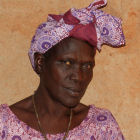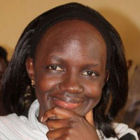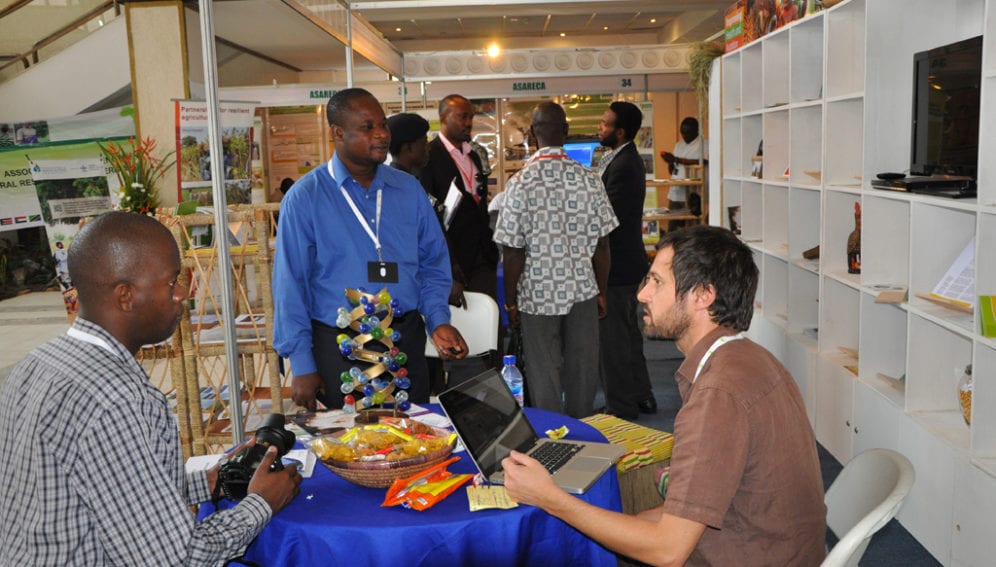By: Esther Nakkazi
Send to a friend
The details you provide on this page will not be used to send unsolicited email, and will not be sold to a 3rd party. See privacy policy.
Science cafés — where scientists talk to local people at popular meeting places — are gaining popularity in Africa, as Esther Nakkazi reports.
[KAMPALA] Juliet Tiperu has been selling malwa, an alcoholic brew made of millet, for 20 years. Most of her customers at the 'Sheraton' restaurant in Entebbe, 35 kilometres outside Uganda's capital Kampala, are men who start strolling in after five o'clock in the afternoon and drink until the end of 'happy hour' for 3,000 Ugandan shillings (US$1.2).
This 'Sheraton' is not a five star hotel, but a grass-thatched hut with no doors and windows. The meeting point in the hut is the malwa pot. On a typical warm Sunday afternoon, music booms and a small television sitting on a pile of old furniture shows lightly-clad girls dancing to bolingo Congolese music.
Arguments are usually about politics — or girls — and the voices of those around the pot get gradually louder, punctuated by sips of malwa.
Except on one day a month, when the venue becomes a science café.
Then there are more people than usual — and not because of the free malwa. "Today we shall discuss cervical cancer, and a vaccine, in the science café," says Tiperu, as she refills the pot with hot water.
Science with your coffee
Science cafés are modeled on thecafés philosophiques that French philosopher Marc Sautet developed in Paris in the 1990s to take philosophical discussions into French coffee houses. Later, science journalist Duncan Dallas adapted the concept to create science cafés in the United Kingdom in 1998.
The idea surfaced in Nairobi, Kenya, where the first of several science cafés was held at the popular Java House café chain in April 2008, funded by Britain's Wellcome Trust under a programme aimed at increasing public engagement with science.
"The cafés involved getting a scientist to discuss their work with a lay audience in an informal setting," says Ruth Wanjala, a communications expert who was a co-founder of the Nairobi science cafés.
The cafés usually began with a short presentation by the scientist. Then non-scientists — including people who had been affected by a certain health condition — were invited to talk about their experiences, giving rise to a lively debate.
For instance, patients talked alongside oncologists on cancer; herbalists and traditional medicine experts spoke at one on traditional medicine; and both sufferers and experts at one on mental health.
Initially, Kenya's scientific community was sceptical, wondering what they were supposed to say to a lay audience. But most soon warmed to the idea.
As for participants, some found it disturbing when, for example, two scientists differed on a topic, says Wanjala. Others complained when the scientists hijacked a café to promote their own products, or advance their political ambitions.
And while the Nairobi cafés were targeted at the more elite, urban-based communities, efforts to launch the same idea in Kibera, the city's largest slum, were less successful. Those who attended the Kibera science café were hungry for food, not knowledge, and were unable to listen attentively to the speakers.
But overall the cafés were a success. "We still get requests to re-launch them," says Juliet Mutheu, co-founder of the Nairobi project. "The most surprising achievement was finding a great appetite for properly disseminated scientific research in Kenya."
Health at Ugandan cafés
The aim of the science cafés in Entebbe is to hold meetings at "convenient timing, in a non-academic location and relaxed informality with high calibre scientists", says Christine Munduru, a public health worker and volunteer leader of the project.
The speaker at the 'Sheraton' this week is Agnes Bukirwa, a medical officer with the Ugandan branch of Mildmay International, a Christian charity that provides HIV/AIDS care services.

Tiperu runs the 'Sheraton' bar in Entebbe, one location of Uganda's science cafés
Esther Nakkazi
Bukirwa introduces herself as Mama Naomi, and says she is going to talk about cervical cancer. The WHO estimates that more than seven million Ugandan women of reproductive age are at risk of developing cervical cancer, that every year about 3,600 women are diagnosed with it, and that almost 2,500 die.
Protection can be provided by the human papilloma virus (HPV) vaccine. "But there are a lot of myths about the HPV vaccine, even among those aware of it, and most people don't even know it exists," says Munduru. "That poses a serious danger to women's health."
How many people know how cervical cancer is transmitted, Bukirwa asks her audience. Pause. How many know how it is prevented? No answer. "Back home you have women who may have cervical cancer," she continues.
A mobile phone is passed around for members to view an image of the cervix. Men shake their heads. Some laugh nervously. Bukirwa explains what HPV is, and how men can transmit it sexually. She speaks for only 30 minutes; adult learners do not want long talks.
Some women stand outside the circle listening. Chickens are pecking at the grains of millet that pour out from the malwa pot when more hot water is added. Children that have come with their mothers chase each other around playfully.
It is question time. To ask one, you need to introduce yourself. "My name is Gaddafi of Uganda," says one man. Everybody laughs loudly. "If cervical cancer is for women, how do men infect women?" he asks.
"Whenever my sister had sex with her husband, there was blood. Now she has cervical cancer. How can you help her when she is already sick?" asks a woman.
One challenge is that when people attend the cafés they want treatment immediately, says Geoffrey Angutoko, the coordinator of the Entebbe-based science café. For example, if they are HIV positive, they expect to get anti-retroviral therapy when the café ends.
"It is important to come up with intervention strategies when engaging very poor communities," says Mutheu in Nairobi, suggesting that pap smears and mammograms should be organised for a community.
But she adds that care must be taken not to turn the café into a medical consultation.
Power of knowledge
Patrice Mawa is attending the Entebbe science café. A biomedical research scientist with the Medical Research Council (MRC), based in Entebbe, he started the science café in 2007.
"I used to go out and people would ask me a lot of questions about the research station. I came up with this idea to give [knowledge] back to the community," he says.
"Knowledge is power. Empowering them and engaging them will make a difference.
"This model captures fewer women than men, who are the decision makers in Uganda, and most do not know much about women's issues. But it benefits women more. We help them with topics based on problems we see in the community, and link them to service providers," he explains.
The Entebbe science café that Mawa runs is one of five awarded US$10,000 in April 2012 to educate developing country populations about disease prevention through vaccines and immunisation.
The awards were made by the Southern Vaccine Advocacy Challenge (SVAC) supported by the Canadian-based Sandra Rotman Centre, with other projects in Egypt, El Salvador, Pakistan and South Africa. Each was selected through peer-reviewed competition among low- and middle-income countries.



Ruth Wanjala: 'The appetite for public engagement with science in Africa is high'
Esther Nakkazi
"These projects are finding new ways to spread basic messages about health, vaccination and immunisation that will have a profound impact on their societies, either by reducing child mortality or improving their quality of life," Peter Singer, director of the Sandra Rotman Centre, said in a statement.
"And they do it in an amazingly effective way, by building the desire and demand for vaccines on the part of the people who need them most."
Reaching more people
Science cafés have grown in popularity in Africa with support from sponsors as varied as Café Scientifique (an online forum), the Wellcome Trust and the public relations company Burness Communications.
According to Wanjala, the appetite for science-public engagement in Africa is high (even though the Kenyan project was forced to close when its funding dried up).
But science cafés need to have wider reach, careful thinking about target audiences, training for organisers, and better evaluation of their effectiveness.
"Cafés are an excellent way to provide scientific information to the public," she says. "The informal, relaxed setting and lively debates are very effective in getting scientists and the public to talk to each other without hang-ups from either side."
In her view, the next phase of science cafés needs to reach more people. She suggests that this could be done through filming cafés and showing them on television, or using other media, where the discussions can have wider reach and more impact.
As she walks home with her husband after the Entebbe science café, Bukirwa is reflective. "It's different to speak at science cafés," she says. "Their questions are different. It is a group that is seeking knowledge."














